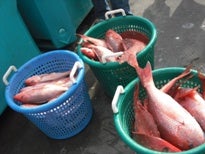Good science should always guide policy. In the ocean, policy reflects decades of scientific work on single species and on single endpoints, like water quality. However, it is now clear that ocean ecosystems are more than the sum of their parts, and policy needs to catch up to this new scientific understanding.
Of course, we must continue to protect the aspects of ocean ecosystems that we value the most. Fisheries need catch limits to keep stocks at sustainable levels. Pollutants need caps to keep waters fishable and swimmable. Forestry and farming need best practices and standards to keep estuaries healthy. But it turns out that ocean ecosystems have tipping points – ecological thresholds beyond which they undergo dramatic changes.
Healthy and resilient ocean ecosystems function similar to the United States government’s system of checks and balances—different species do similar things but in slightly different ways, which help keep these systems both interconnected and even-keeled. However, when we reduce species populations so much they can no longer do their part, we alter the natural balance of the system, which can have grave effects.
Luxuriant kelp forests that support marine mammals and a myriad of other species provide us with various ecosystem services like seafood, agar (sugar made from kelp), recreation, and sheltering the coastline from waves. However, these habitats can turn to rocky barrens very rapidly when they reach their tipping points. We witnessed this in the 1800s when fur hunting became prevalent—decreasing the sea otter population. With fewer sea otter to consume urchins, urchins became overabundant, overgrazing the kelp and causing forests to disappear.
Fortunately, science is providing insights into the factors that make ocean ecosystems more capable of resisting these kinds of changes, and more able to bounce back when they are damaged; in other words, the attributes that make some systems more resilient than others. Having lots of species with different ecological jobs (biodiversity and niches) is very important, as is having several species doing the same job but in slightly different ways (functional redundancy). Lots of genetic diversity within species and populations is important as well. It’s a little like rocket science: rockets are complex systems that are made more robust and resilient (i.e., less likely to blow up) by building in redundant subsystems. Nature has done that one better by building in even more diversity, allowing coral reefs for example to recover from hurricanes and even volcanic eruptions that devastate human communities.
In an ocean in which the temperature, pH, currents, weather, and human uses are changing, it makes much more sense to manage for resilient ecosystems than manage for maximum sustainable yield of one species or another. Who knows what the next big impact to the ocean will be? We need to increase resiliency so that no matter what, ocean ecosystems can persist and continue to provide the many valuable ecosystem services upon which we depend. Our new paper draws on the science of ecosystem resilience and lays out a policy framework for achieving this goal.











 Earlier this summer
Earlier this summer